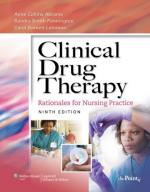|
This section contains 146 words (approx. 1 page at 300 words per page) |
In its broadest sense, pharmacology can be defined as the science dealing with interactions between living systems and mole-cules—in particular, chemicals (i.e., drugs)—usually introduced from outside the system. This definition also includes medical pharmacology, which is the science of drugs used to prevent, diagnose, and treat disease. Also included are the important roles played by chemicals in the environment that can cause disease, as well as the use of certain chemicals as molecular probes for the study of normal biochemistry and physiology. Toxicology is the branch of pharmacology that deals with the undesirable (i.e., toxic) effects of chemicals in biological systems.
See Also
Drug; Drug Metabolism; Drug Types; Pharmacodynamics; Poison)
Bibliography
BENET, L. Z., MITCHELL, J. R., & SHEINER, L. B. (1990). General principles. In A. G. Gilman et al. (Eds.), Goodman and Gilman's the pharmacological basis of therapeutics, 8th ed. New York: Pergamon.
|
This section contains 146 words (approx. 1 page at 300 words per page) |


